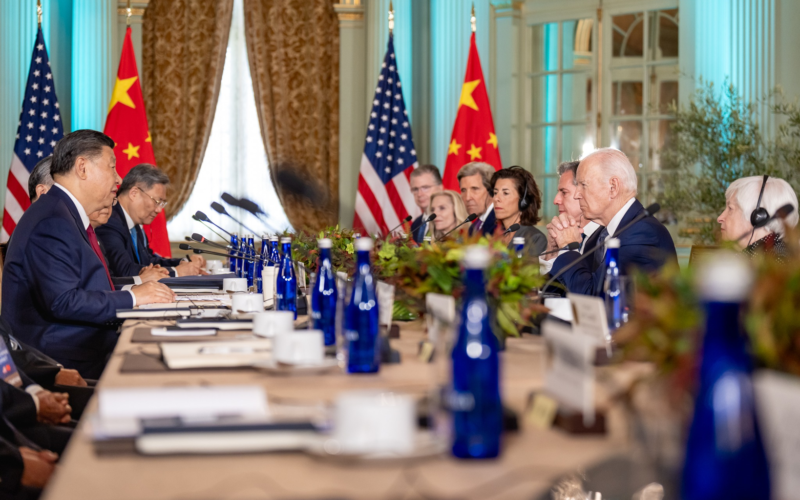Good morning, and welcome to The Yappie’s AAPI politics briefing — your guide to the policy news and activism affecting Asian Americans + Pacific Islanders. Send tips and feedback to [email protected] and support our work by making a donation.
— Edited by Shawna Chen
The Biden Era
BIDEN-XI MEET AT APEC SUMMIT DRAWS PROTESTS: President Joe Biden met with Chinese President Xi Jinping for the first time in over a year during the Asia-Pacific Economic Cooperation (APEC) summit last week, where the two leaders discussed military and economic relations between the U.S. and China. Xi’s visit spurred crowds of anti-Communist Asian Americans to rally in San Francisco.
- The state of U.S.-China ties is a contentious topic for many Asian Americans. While thousands gathered in San Francisco to welcome APEC leaders, others faced off in dueling protests for and against the arrival of more controversial leaders, including Xi and Filipino President Bongbong Marcos.
- A July survey by the Pew Research Center found that about 52% of Asian adults have an unfavorable opinion of China, and that Chinese Americans view their country of origin in a less favorable light compared to other Asian American groups.
- The bilateral meeting itself yielded mixed results.Biden and Xi did agree to restore military communications between their armed forces—they were severed in August last year when then-House Speaker Nancy Pelosi (D-California) visited Taiwan. The two did not, however, reach an agreement on Taiwan. Xi continues to warn Biden to stop providing military support to the island.
- While Biden said afterward that he still believes Xi is a dictator, the tworeaffirmed their commitment to combating the U.S.’s fentanyl crisis through the creation of a counternarcotics working group that would help stem the flow of illicit precursory chemicals, synthetic drugs, and fentanyl from China.
- Don’t forget: In both 2020 and 2021, rates of drug overdose among Native Hawaiians and Pacific Islanders increased by 47% according to the Centers for Disease Control and Prevention. It was the largest percentage increase of all race and origin groups.
WHITE HOUSE ALLOCATES $20 MILLION TO CLIMATE RESILIENCE FOR NATIVE HAWAIIANS: The Department of the Interior recently announced plans to provide $20 million in funding to support the new Kapapahuliau Climate Resilience Program under its Office of Native Hawaiian Relations.
- The funding is part of Biden’s Inflation Reduction Act and aims to help Native Hawaiian organizations navigate and adapt to the effects of climate change while maintaining their cultural identities.
- In Hawai‘i, climate change has already led to rising sea levels, ocean acidification, coastal flooding, erosion, extreme weather events, and loss of native species, as well as damage to homes, businesses, and other infrastructure.
On The Hill


ADVOCACY GROUPS CHALLENGE SURVEILLANCE REAUTHORIZATION: AAPI-led organizations are calling on Senate leaders to reject an extension of Section 702 of the Foreign Intelligence Surveillance Act (FISA) as top lawmakers consider amending must-pass legislation to include short-term reauthorization of the surveillance authority, Wired’s Dell Cameron reports.
- Section 702 gives surveillance privileges to the U.S. intelligence community for information involving international security threats to national security. While Section 702 prohibits intentionally targeting Americans, provisions in the act allow for incidental collection of American citizen communication.
- But civil rights advocates say Asian Americans could be especially vulnerable to incidental collection, especially in the aftermath of the Justice Department’s controversial China Initiative.
- A recent study published in the Proceedings of the National Academy of Sciences found that 67% of Chinese American scientists felt unsafe due to U.S.-led investigations into Chinese-origin researchers, while 37% feared that their family, friends, or collaborators may be targeted due to something they say or do.
- What’s happening: 63 AAPI and allied organizations, including Asian Americans Advancing Justice, the South Asian Network, and Stop AAPI Hate, authored a letter to Congress last week calling out the misuse of such surveillance authorities. Failure to reject short-term authorization would “perpetuate a system that unjustly targets Asian Americans and subjects them to unwarranted surveillance,” they write.
- In their words: “This disproportionate targeting has fostered a climate of fear among Asian Americans and their families, causing anxiety about being stopped, monitored, or investigated while engaging in everyday activities,” the letter noted. “These issues not only raise significant concerns about civil liberties and civil rights, but also underscore the need for substantial reform.”
RENEWED PUSH TO AUTHORIZE SNAP FOR COFA MIGRANTS: Negotiations for the Compacts of Free Association (COFA) are largely finalized, but lawmakers are still fighting to grant access to federal benefits—such as Supplemental Nutrition Assistance Program (SNAP)—to citizens of the three freely associated states: Palau, the Federated States of Micronesia, and the Republic of the Marshall Islands.
- Pacific Islander hunger rates are often obscured in U.S. data due to the lack of disaggregated collection, but a recent analysis by the nonprofit Arkansas Advocates for Children and Families notes that around 19% of Pacific Islanders experience food insecurity compared to 6% of Asian Americans.
- Citizens of the three nations who live in the U.S.—known as COFA migrants—cannot access SNAP on account of a 1996 bill that defined “qualified aliens” as lawful U.S. immigrants who could access such federal benefits. As outlined in the compacts, however, COFA migrants are neither immigrants nor U.S. citizens, leaving them excluded entirely.
- Sen. Mazie Hirono (D-Hawai‘i) and Rep. Ed Case (D-Hawai‘i) are leading efforts to restore access to these benefits under legislation that has been endorsed by the Biden administration. The bill would directly amend the 1996 legislation by adding an exception for FAS citizens and changing the definition of a “qualified alien.”
CAPAC CALLS ON WHITE HOUSE TO CLEAR VISA BACKLOGS: The Congressional Asian Pacific American Caucus (CAPAC) is urging Biden to reduce the visa backlog for family-based immigration.
- 1.5 million of the almost 4 million people stuck in the backlogs are from Asia, according to a report by the Department of State. According to the same report, six of the top ten countries with folks waiting in the U.S. visa backlogs are countries in Asia.
- In their words: “This backlog shows the inability of our immigration system to meet the needs of Americans as well as prospective immigrants,” CAPAC members wrote in a letter to the White House last week. “Members of our communities have been separated from their family members for years, waiting with approved applications for an extremely limited pool of visas to become available.”
- The letter also highlighted the prolonged family separation that happens on account of backlogged visa distribution and called for the Biden administration to implement policies to recapture unused visas so they can be added to current caps and used for family-reunification parole.
Campaign Watch


FIRST BIDEN AD TARGETING AAPIS SPOTLIGHTS SMALL BUSINESS: The Biden campaign has launched the first in a new series of ads targeting AAPI voters ahead of the 2024 election.
- The 30-second clip, first reported by NBC Asian America’s Sakshi Venkatraman, features Jenny Poon, a Vietnamese American business owner whose parents came to the U.S. as refugees.
- Poon, the founder of an Arizona co-working space where over 1,000 entrepreneurs are based, says in the ad that watching her parents run their restaurant as a child taught her “what it takes to build a business and raise a family.”
- The ad is meant to communicate a “clear choice facing the AAPI community” between the small business-supporting Biden and Republicans supporting tax breaks for the rich and powerful, Biden campaign manager Julie Chavez Rodriguez said in a statement.
- By the numbers: AAPIs own more of America’s 1.2 million minority-owned businesses than any other minority group, especially dominating the accommodations and food service industries.
NEW REPORT WARNS OF AAPI VOTER SUPPRESSION IN KEY BATTLEGROUND STATE: Georgia voting laws passed in 2021 disproportionately reduced mail-in voting among AAPI residents in 2022, according to a new study by the civil rights group Asian Americans Advancing Justice-Atlanta.
- A near-doubling of AAPI voter turnout in Georgia helped Biden win the state in 2020—the first time the state voted for a Democratic presidential candidate in nearly 30 years.
- Key stat: AAPI voters voted by mail at twice the rate of all voters in Georgia in 2018. The overall rate increased from 5.6% to 6.2% among all voters for 2022 but decreased from 11.2% to 9% for AAPI voters.
- The study attributes the decline to legislation passed in 2021 to restrict elections officials from proactively sending out mail-in ballots, criminalize unauthorized assistance for voters, require voters to request ballots at an earlier deadline, and create a quota for the number of drop boxes a county could have.
- After the bill went into effect, 77% of Asian American voters saw the number of drop boxes in their country decrease—the largest decline out of all racial or ethnic groups, the study found. The rate of rejection for AAPI voter absentee ballots was also more than twice the rate of rejection for voters overall.
- Worth noting: Language barriers also played a role. 1 in 3 Asian Americans in Georgia have limited English proficiency, but no single language meets federal thresholds to require translated voting materials.
INVESTING IN AAPI ART FOR CIVIC ENGAGEMENT: The AAPI Civic Engagement Fund has awarded $30,000 to five AAPI artists to create multimedia art around themes of “Voting Together, Solidarity, and Belonging.”
- The funded projects include a short comedic film about a Filipino American family discussing ballot measures and candidates, a series of illustrations and posters including the Native Hawaiian language of ʻŌlelo Hawaiʻi, and a webcomic targeting Gen Z voters.
- Why this matters: “We know the AAPI vote can make and break elections,” AAPI Civic Engagement Fund executive director EunSook Lee said in a statement. “Art and social change starts at the personal level and we are grateful that these phenomenal artists will be creating work that speaks to the Asian American and Pacific Islander experience today.”
- The organization previously supported art projects like the ABC’s of AAPIs coloring book, a South Asian American history book, and a documentary film about the resettlement of Southeast Asians in Philadelphia.
🥰 Enjoying The Yappie? Make a donation, forward this briefing to a friend, or subscribe here. You can also follow us on Twitter, Instagram, and Facebook.
The Yappie is your must-read briefing on AAPI power, politics, and influence, fiscally sponsored by the Asian American Journalists Association. Make a donation, subscribe, and follow us on Twitter (@theyappie). Send tips and feedback to [email protected].









